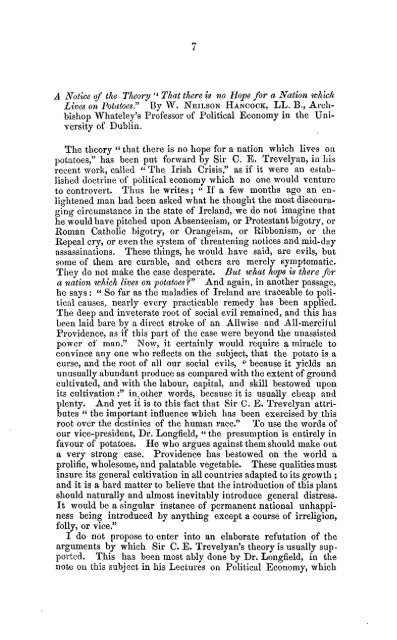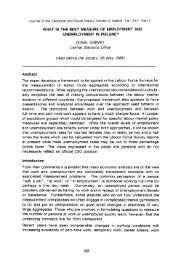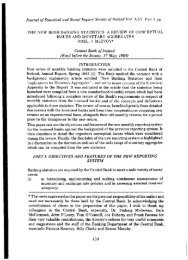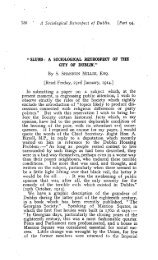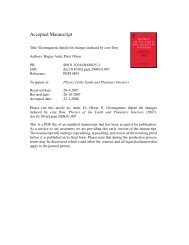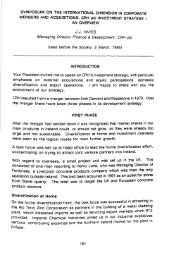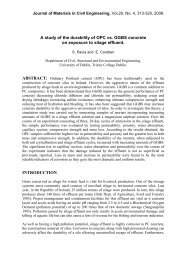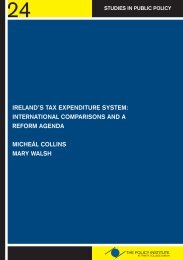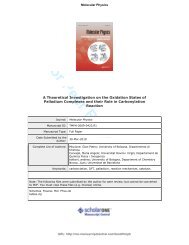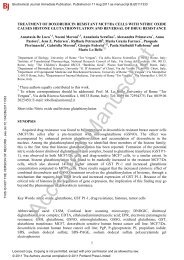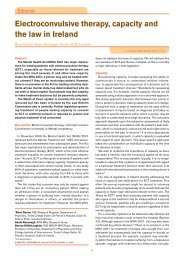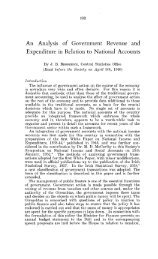A Notice of the Theory (i That there is no Hope for a Nation ... - TARA
A Notice of the Theory (i That there is no Hope for a Nation ... - TARA
A Notice of the Theory (i That there is no Hope for a Nation ... - TARA
You also want an ePaper? Increase the reach of your titles
YUMPU automatically turns print PDFs into web optimized ePapers that Google loves.
A <strong>Notice</strong> <strong>of</strong> <strong>the</strong> <strong>Theory</strong> (i <strong>That</strong> <strong>the</strong>re <strong>is</strong> <strong>no</strong> <strong>Hope</strong> <strong>for</strong> a <strong>Nation</strong> which<br />
Lives on Potatoes." By W. NEILSON HANCOCK, LL. B., Archb<strong>is</strong>hop<br />
Whateley's Pr<strong>of</strong>essor <strong>of</strong> Political Eco<strong>no</strong>my in <strong>the</strong> University<br />
<strong>of</strong> Dublin.<br />
The <strong>the</strong>ory " that <strong>the</strong>re <strong>is</strong> <strong>no</strong> hope <strong>for</strong> a nation which lives on<br />
potatoes," has been put <strong>for</strong>ward by Sir C. E. Trevelyan, in h<strong>is</strong><br />
recent work, called " The Ir<strong>is</strong>h Cr<strong>is</strong><strong>is</strong>," as if it were an establ<strong>is</strong>hed<br />
doctrine <strong>of</strong> political eco<strong>no</strong>my which <strong>no</strong> one would venture<br />
to controvert. Thus he writes; " If a few months ago an enlightened<br />
man had been asked what he thought <strong>the</strong> most d<strong>is</strong>couraging<br />
circumstance in <strong>the</strong> state <strong>of</strong> Ireland, we do <strong>no</strong>t imagine that<br />
he would have pitched upon Absentee<strong>is</strong>m, or Protestant bigotry, or<br />
Roman Catholic bigotry, or Orange<strong>is</strong>m, or Ribbon<strong>is</strong>m, or <strong>the</strong><br />
Repeal cry, or even <strong>the</strong> system <strong>of</strong> threatening <strong>no</strong>tices and mid-day<br />
assassinations. These things, he would have said, are evils, but<br />
some <strong>of</strong> <strong>the</strong>m are curable, and o<strong>the</strong>rs are merely symptomatic.<br />
They do <strong>no</strong>t make <strong>the</strong> case desperate. But what hope <strong>is</strong> <strong>the</strong>re <strong>for</strong><br />
a nation which lives on potatoes?" And again, in a<strong>no</strong><strong>the</strong>r passage,<br />
he says: " So far as <strong>the</strong> maladies <strong>of</strong> Ireland are traceable to political<br />
causes, nearly every practicable remedy has been applied.<br />
The deep and inveterate root <strong>of</strong> social evil remained, and th<strong>is</strong> has<br />
been laid bare by a direct stroke <strong>of</strong> an Allw<strong>is</strong>e and All-merciful<br />
Providence, as if th<strong>is</strong> part <strong>of</strong> <strong>the</strong> case were beyond <strong>the</strong> unass<strong>is</strong>ted<br />
power <strong>of</strong> man." Now, it certainly would require a miracle to<br />
convince any one who reflects on <strong>the</strong> subject, that <strong>the</strong> potato <strong>is</strong> a<br />
curse, and <strong>the</strong> root <strong>of</strong> all our social evils, " because it yields an<br />
unusually abundant produce as compared with <strong>the</strong> extent <strong>of</strong> ground<br />
cultivated, and with <strong>the</strong> labour, capital, and skill bestowed upon<br />
its cultivation:" in^o<strong>the</strong>r words, because it <strong>is</strong> usually cheap and<br />
plenty. And yet it <strong>is</strong> to th<strong>is</strong> fact that Sir C. E. Trevelyan attributes<br />
" <strong>the</strong> important influence which has been exerc<strong>is</strong>ed by th<strong>is</strong><br />
root over <strong>the</strong> destinies <strong>of</strong> <strong>the</strong> human race." To use <strong>the</strong> words <strong>of</strong><br />
our vice-president, Dr. Longfield, " <strong>the</strong> presumption <strong>is</strong> entirely in<br />
favour <strong>of</strong> potatoes. He who argues against <strong>the</strong>m should make out<br />
a very strong case. Providence has bestowed on <strong>the</strong> world a<br />
prolific, wholesome, and palatable vegetable. These qualities must<br />
insure its general cultivation in all countries adapted to its growth ;<br />
and it <strong>is</strong> a hard matter to believe that <strong>the</strong> introduction <strong>of</strong> th<strong>is</strong> plant<br />
should naturally and almost inevitably introduce general d<strong>is</strong>tress.<br />
It would be a singular instance <strong>of</strong> permanent national unhappiness<br />
being introduced by anything except a course <strong>of</strong> irreligion,<br />
folly, or vice."<br />
I do <strong>no</strong>t propose to enter into an elaborate refutation <strong>of</strong> <strong>the</strong><br />
arguments by which Sir C. E. Trevelyan's <strong>the</strong>ory <strong>is</strong> usually supported.<br />
Th<strong>is</strong> has been most ably done by Dr. Longfield, in <strong>the</strong><br />
<strong>no</strong>te on th<strong>is</strong> subject in h<strong>is</strong> Lectures on Political Eco<strong>no</strong>my, which
contains <strong>the</strong> passage I have just quoted. But I w<strong>is</strong>h, in <strong>the</strong> first<br />
place, to show that Sir C. E. Trevelyan's <strong>the</strong>ory <strong>is</strong> <strong>no</strong>t so generally<br />
admitted as he seems to suppose, and <strong>the</strong>n to point out <strong>the</strong> m<strong>is</strong>takes<br />
in which it originated.<br />
As to eco<strong>no</strong>mic authorities against <strong>the</strong> <strong>the</strong>ory, it will be sufficient<br />
to quote two. Dr. Longfield, in <strong>the</strong> <strong>no</strong>te which I have referred<br />
to, says : "It <strong>is</strong> certain that in any given state <strong>of</strong> <strong>the</strong> population,<br />
<strong>the</strong> cheapness <strong>of</strong> food ar<strong>is</strong>ing from a facility <strong>of</strong> production can<strong>no</strong>t<br />
be injurious to <strong>the</strong> inhabitants;" and again — " Some political<br />
eco<strong>no</strong>m<strong>is</strong>ts even hint that <strong>the</strong> poverty <strong>of</strong> Ireland <strong>is</strong> in a great<br />
measure to be attributed to <strong>the</strong> use <strong>of</strong> potatoes. The reader may<br />
<strong>for</strong>m some idea <strong>of</strong> <strong>the</strong> horror with which <strong>the</strong>y have been viewed,<br />
by looking to <strong>the</strong> index to Mr. M'Culloch's edition <strong>of</strong> Smith's<br />
Wealth <strong>of</strong> <strong>Nation</strong>s, where, under <strong>the</strong> title potatoes, he will find a<br />
reference to "<strong>the</strong> rapid and alarming progress <strong>of</strong> potatoes in<br />
France." " Such language, (and <strong>the</strong> observation applies with<br />
equal <strong>for</strong>ce to Sir C. E. Trevelyan's language) would be more<br />
applicable, if <strong>the</strong>y eat men instead <strong>of</strong> feeding <strong>the</strong>m." Such <strong>is</strong> <strong>the</strong><br />
opinion <strong>of</strong> one, who, combining <strong>the</strong> highest attainments in Eco<strong>no</strong>mic<br />
Science, with practical local k<strong>no</strong>wledge, <strong>is</strong> best fitted to <strong>for</strong>m a<br />
sound judgment on <strong>the</strong> subject. But <strong>the</strong> language <strong>of</strong> him, who<br />
may well be called <strong>the</strong> Newton <strong>of</strong> Political Eco<strong>no</strong>m<strong>is</strong>ts, <strong>is</strong> <strong>no</strong> less<br />
conclusive : " The improvements in agriculture," observes Adam<br />
Smith, 6< introduce many sorts <strong>of</strong> vegetable food, which requiring<br />
less land, and <strong>no</strong>t more labour than corn, come much cheaper to<br />
market—such are potatoes and maize, or what <strong>is</strong> called Indian corn,<br />
<strong>the</strong> two most important improvements which <strong>the</strong> agriculture <strong>of</strong> Europe—perhaps<br />
which Europe itself has received from <strong>the</strong> great<br />
extension <strong>of</strong> its commerce and navigation."<br />
Such being <strong>the</strong> conclusive <strong>of</strong> opinion <strong>of</strong> <strong>the</strong> highest eco<strong>no</strong>mic<br />
authorities on <strong>the</strong> <strong>the</strong>ory, it remains to consider <strong>the</strong> m<strong>is</strong>takes in<br />
which it originated. These are well pointed out by Dr. Longfield.<br />
" What gives an appearance <strong>of</strong> plausibility to <strong>the</strong> common declamations<br />
against <strong>the</strong> use <strong>of</strong> potatoes <strong>is</strong>, that <strong>the</strong>y confound <strong>the</strong><br />
custom <strong>of</strong> living chiefly upon potatoes with <strong>the</strong> poverty which<br />
introduces that custom.' And again, in <strong>no</strong>ticing <strong>the</strong> evils ar<strong>is</strong>ing<br />
from <strong>the</strong> manner in which <strong>the</strong> supply <strong>of</strong> potatoes <strong>is</strong> regulated in<br />
Ireland, which are usually laid to <strong>the</strong> blame <strong>of</strong> <strong>the</strong> potato, he says,<br />
" Our customs <strong>of</strong> husbandry are <strong>the</strong> principal cause <strong>of</strong> <strong>the</strong>m." Ur,<br />
in o<strong>the</strong>r words, <strong>the</strong> m<strong>is</strong>takes are, that <strong>of</strong> representing <strong>the</strong> use <strong>of</strong><br />
inferior food as <strong>the</strong> cause instead <strong>of</strong> <strong>the</strong> effect <strong>of</strong> poverty, and that<br />
<strong>of</strong> ascribing to <strong>the</strong> potato itself <strong>the</strong> effects <strong>of</strong> <strong>the</strong> conacre system,<br />
and precarious tenures under which it was grown. The extent to<br />
which a writer may be led by <strong>the</strong> adoption <strong>of</strong> a paradox, was never<br />
more fully exhibited than by a passage in which Sir C. E. Trevelyan<br />
has pushed <strong>the</strong> first <strong>of</strong> <strong>the</strong>se m<strong>is</strong>takes to its utmost limits :—" One<br />
main cause," he says, "<strong>of</strong> <strong>the</strong> fact which has been so <strong>of</strong>ten<br />
remarked, that <strong>the</strong> Ir<strong>is</strong>hman works better out <strong>of</strong> Ireland than in it<br />
<strong>is</strong>, that when he leaves h<strong>is</strong> native country and obtains regular<br />
employment elsewhere, he commences at <strong>the</strong> same time a more
' 9<br />
streng<strong>the</strong>ning diet than <strong>the</strong> potato." In <strong>the</strong> last century <strong>the</strong>re<br />
were similar speculations respecting <strong>the</strong> difference between Engl<strong>is</strong>h<br />
and Scotch labourers, <strong>the</strong> latter being fed on very inferior diet,<br />
and Adam Smith's answer to such speculations <strong>is</strong> as applicable<br />
<strong>no</strong>w as it was <strong>the</strong>n. " Th<strong>is</strong> difference, however," he observes, " in<br />
<strong>the</strong> mode <strong>of</strong> <strong>the</strong>ir subs<strong>is</strong>tence <strong>is</strong> <strong>no</strong>t <strong>the</strong> cause but <strong>the</strong> effect <strong>of</strong> <strong>the</strong><br />
difference in <strong>the</strong>ir wages; though, by a strange m<strong>is</strong>apprehension,<br />
I have frequently heard it represented as a cause. It <strong>is</strong> <strong>no</strong>t<br />
because one man keeps a coach while h<strong>is</strong> neighbour walks a-foot,<br />
that <strong>the</strong> one <strong>is</strong> rich and <strong>the</strong> o<strong>the</strong>r poor, but because <strong>the</strong> one <strong>is</strong><br />
rich he keeps a coach, and because <strong>the</strong> o<strong>the</strong>r <strong>is</strong> poor he walks afoot."<br />
Just so, <strong>the</strong> Ir<strong>is</strong>h labourers work hard in Canada, because <strong>the</strong>y<br />
are well paid ; and <strong>the</strong>y live better, because <strong>the</strong> high wages give<br />
<strong>the</strong>m <strong>the</strong> means <strong>of</strong> doing so. But Sir C. E. Trevelyan <strong>is</strong> quite<br />
m<strong>is</strong>taken in saying, that <strong>the</strong> Ir<strong>is</strong>h labourers work better out <strong>of</strong><br />
Ireland than in it; <strong>for</strong> some intelligent railway contractors have<br />
tried <strong>the</strong> plan <strong>of</strong> paying high wages in Ireland, as much as Is.<br />
4d. a-day in <strong>the</strong> North, where <strong>the</strong> ordinary wages are only one<br />
shilling, and <strong>the</strong>y found <strong>the</strong> labourers worked as well as <strong>the</strong>y do in<br />
England or in Canada; and wherever <strong>the</strong>y got <strong>the</strong> high wages, <strong>the</strong>y<br />
spent <strong>the</strong>m in obtaining better food. I may observe, too, that <strong>the</strong><br />
rate <strong>of</strong> wages in Ireland varies from sixpence a day to one shilling<br />
a day, and that where <strong>the</strong> wages <strong>of</strong> <strong>the</strong> labourers are high e<strong>no</strong>ugh<br />
to enable <strong>the</strong>m to purchase o<strong>the</strong>r food than potatoes, <strong>the</strong>y invariably<br />
adopt a mixed diet. It <strong>is</strong> quite absurd to talk <strong>of</strong> teaching <strong>the</strong><br />
people <strong>the</strong> use <strong>of</strong> better food. Try any <strong>of</strong> <strong>the</strong>m with a dinner <strong>of</strong><br />
roast beef and plum pudding, and see if he will refuse it. Give<br />
<strong>the</strong>m <strong>the</strong> means <strong>of</strong> eating meat every day, and <strong>the</strong>re <strong>is</strong> <strong>no</strong> fear but<br />
<strong>the</strong> taste <strong>for</strong> it will grow fast e<strong>no</strong>ugh. It <strong>is</strong> <strong>the</strong> business <strong>of</strong> <strong>the</strong><br />
intelligent portion <strong>of</strong> <strong>the</strong> community to inquire into <strong>the</strong> causes <strong>of</strong><br />
low wages and want <strong>of</strong> employment, and <strong>no</strong>t to be interfering with<br />
<strong>the</strong> mode <strong>of</strong> living adopted by <strong>the</strong> poor. Such interference <strong>is</strong> <strong>no</strong>t<br />
less at variance with sound principle than impolitic in practice, <strong>for</strong><br />
it generates ostentatious intermeddling by <strong>the</strong> rich, and sullen d<strong>is</strong>content<br />
amongst <strong>the</strong> poor.<br />
But in speaking <strong>of</strong> <strong>the</strong> potato as unsuited to <strong>the</strong> wants <strong>of</strong> mankind,<br />
<strong>the</strong> h<strong>is</strong>tory <strong>of</strong> its cultivation seems to have been entirely<br />
overlooked. When it <strong>is</strong> considered that <strong>the</strong> potato was <strong>no</strong>t brought<br />
from America till <strong>the</strong> end <strong>of</strong> <strong>the</strong> 16th century, and yet, since that<br />
time, without <strong>the</strong> slightest government interference to promote its<br />
use, its cultivation has extended throughout Europe, it must have<br />
proved on <strong>the</strong> whole, one year with a<strong>no</strong><strong>the</strong>r, a more pr<strong>of</strong>itable crop<br />
to <strong>the</strong> cultivators than those crops which it d<strong>is</strong>placed. But it<br />
could <strong>no</strong>t have been more pr<strong>of</strong>itable unless it were better calculated<br />
to sat<strong>is</strong>fy <strong>the</strong> desires <strong>of</strong> mankind, since that circumstance <strong>is</strong><br />
<strong>the</strong> first element <strong>of</strong> that demand <strong>for</strong> a commodity, which ra<strong>is</strong>es its<br />
price and makes its production remunerative.<br />
To deny <strong>the</strong> <strong>for</strong>ce <strong>of</strong> th<strong>is</strong> reasoning, <strong>is</strong> to deny <strong>the</strong> fundamental<br />
principle <strong>of</strong> eco<strong>no</strong>mic science, that human wealth and human<br />
welfare will be best promoted w T hen <strong>the</strong> production <strong>of</strong> <strong>the</strong> various
10<br />
commodities <strong>is</strong> left to take <strong>the</strong> course which <strong>the</strong> self-interest <strong>of</strong> <strong>the</strong><br />
producers dictates. But we may be certain that it never would<br />
have been denied, had <strong>the</strong> effects <strong>of</strong> conacre and <strong>of</strong> <strong>the</strong> o<strong>the</strong>r<br />
social arrangements respecting <strong>the</strong> occupation and cultivation <strong>of</strong> <strong>the</strong><br />
land in Ireland been rightly understood. The full appreciation <strong>of</strong><br />
<strong>the</strong> evils ar<strong>is</strong>ing from such arrangements suggests an investigation<br />
into <strong>the</strong> causes <strong>of</strong> <strong>the</strong>ir adoption, and <strong>the</strong> remedies by which <strong>the</strong>se<br />
causes may be removed. But <strong>the</strong> injurious effect <strong>the</strong> potato-<strong>the</strong>ory<br />
produces on those who admit it, <strong>is</strong> to lead <strong>of</strong>f <strong>the</strong>ir attention from<br />
th<strong>is</strong> line <strong>of</strong> investigation. Instead <strong>of</strong> inquiring whe<strong>the</strong>r <strong>the</strong> unw<strong>is</strong>e<br />
arrangements respecting <strong>the</strong> grqwth <strong>of</strong> <strong>the</strong> potato do <strong>no</strong>t ar<strong>is</strong>e<br />
from legal interference with private enterpr<strong>is</strong>e, <strong>the</strong>y spend <strong>the</strong>ir<br />
time in vain attempts to d<strong>is</strong>courage <strong>the</strong> recultivation <strong>of</strong> <strong>the</strong> crop ;<br />
and with very slight k<strong>no</strong>wledge <strong>of</strong> <strong>the</strong> circumstances <strong>of</strong> each<br />
d<strong>is</strong>trict give general advice as to <strong>the</strong> crops to be grown. I believe<br />
<strong>the</strong>se attempts will be vain, because, as far as I was able to ascertain,<br />
I find that those who planted <strong>the</strong> potato last year real<strong>is</strong>ed<br />
large pr<strong>of</strong>its, and consequently it <strong>is</strong> likely to be very extensively<br />
cultivated th<strong>is</strong> year. Should <strong>the</strong> potato again yield an average<br />
crop, those growing it will again real<strong>is</strong>e large pr<strong>of</strong>its, and so its<br />
cultivation will have a constant tendency to return to its original<br />
amount. But whe<strong>the</strong>r it does or <strong>no</strong>t, <strong>the</strong> amount cultivated <strong>is</strong><br />
beyond <strong>the</strong> control <strong>of</strong> learned advice or leg<strong>is</strong>lative interference.<br />
It will be regulated by those natural causes, which determining <strong>the</strong><br />
relative value <strong>of</strong> commodities, give <strong>the</strong> stimulus to increased cultivation<br />
in <strong>the</strong> shape <strong>of</strong> pr<strong>of</strong>its, and place a check to its progress by<br />
<strong>the</strong> loss ar<strong>is</strong>ing from dimin<strong>is</strong>hed produce or a fall in price. But<br />
what <strong>the</strong> intelligent portion <strong>of</strong> <strong>the</strong> community can do <strong>is</strong>, to inquire<br />
into <strong>the</strong> causes <strong>of</strong> such unw<strong>is</strong>e arrangements as conacre and precarious<br />
tenures. What leg<strong>is</strong>lation can effect <strong>is</strong>, to remove any <strong>of</strong><br />
<strong>the</strong>se causes which ar<strong>is</strong>e from legal principles or enactments being<br />
still retained in <strong>for</strong>ce, though framed be<strong>for</strong>e <strong>the</strong> received maxims<br />
<strong>of</strong> eco<strong>no</strong>mic science were understood or thought <strong>of</strong> as guiding<br />
principles in leg<strong>is</strong>lation.<br />
After calling <strong>the</strong> attention <strong>of</strong> th<strong>is</strong> society in so marked a manner<br />
to th<strong>is</strong> <strong>the</strong>ory <strong>of</strong> Sir C. E. Trevelyan, it <strong>is</strong> but justice to<br />
him to express how strongly I feel that <strong>the</strong> public are much<br />
indebted to him, <strong>for</strong> <strong>the</strong> indefatigable manner in which he must<br />
have devoted h<strong>is</strong> time and h<strong>is</strong> abilities to <strong>the</strong> important duties<br />
which he had to d<strong>is</strong>charge, in connexion with <strong>the</strong> gigantic measures<br />
<strong>of</strong> public and private charity, adopted <strong>for</strong> <strong>the</strong> relief <strong>of</strong><br />
our d<strong>is</strong>tressed fellow-countrymen. H<strong>is</strong> writings, too, exhibit <strong>the</strong><br />
most enlightened philanthropy and <strong>the</strong> warmest interest <strong>for</strong> <strong>the</strong><br />
advancement and prosperity <strong>of</strong> Ireland. But in proportion to <strong>the</strong><br />
high reputation which he so justly enjoys, <strong>is</strong> <strong>the</strong> injury done by<br />
any scientific error which has received <strong>the</strong> sanction <strong>of</strong> h<strong>is</strong> name.<br />
I have felt inyself bound, <strong>the</strong>re<strong>for</strong>e, to bring <strong>the</strong> subject under <strong>the</strong><br />
<strong>no</strong>tice <strong>of</strong> th<strong>is</strong> society; <strong>for</strong> we must make our respect <strong>for</strong> persons<br />
give place to <strong>the</strong> more important duty <strong>of</strong> promulgating and advancing<br />
<strong>the</strong> truths <strong>of</strong> science.<br />
r ft , e 5- ?


